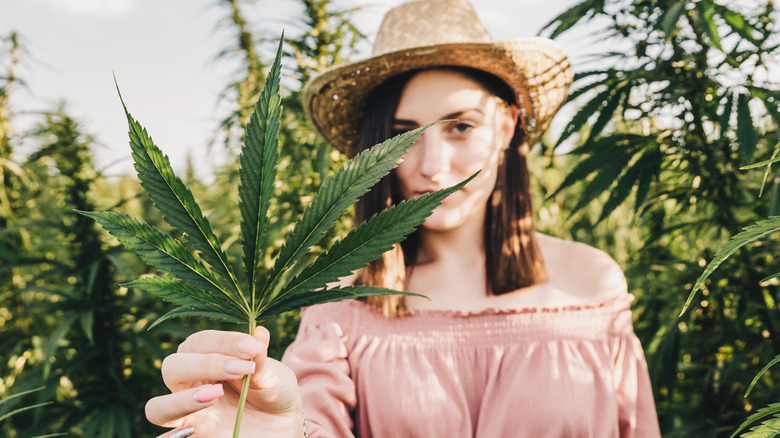The Big Reason Marijuana Makes People So Hungry
Containing the psychoactive chemical ingredient delta-9-tetrahydrocannabinol (THC), marijuana is among the most frequently used drugs across the country, reports the National Institute on Drug Abuse. Upon inhalation, THC is expelled into our blood, where it's then transported to the brain and other areas of the body, with levels spiking in sometimes as little as three minutes (via GoodRx Health). More immediate side effects include shifts in mood, difficulty with physical movements, or changes in one's awareness of time, colors, and more. Continuous use of the drug over time may increase one's risk of mental health problems, such as anxiety, depression, or episodes of paranoia or hallucinations.
There's another side effect people often experience when using the mind-altering substance that's long been considered a little more mysterious: the munchies. The wave of hunger that hits after smoking or ingesting cannabis was the subject of research in a 2019 study published in Human Ethology, in which participants reported that the amount of food they eat tends to increase when intoxicated with marijuana, particularly unhealthy snacks. Science shows that the reason marijuana makes us so hungry is because it essentially fools our brain into thinking we're famished, when that may not actually be the case.
Cannabinoids switch the messaging of our neurons
"It's like pressing a car's brakes and accelerating instead," said Tamas Horvath, lead author of a 2015 rodent study published in Nature, during a press release (via PBS). The research paper explains that natural cannabinoid receptors in our brain help keep our food intake in check. A specific group of neurons, known as POMC neurons, tells us when we've had enough. Knowing this, the researchers theorized that weed must suppress POMC neural activity, which would dampen its messaging of "Hey, you're full!" and subsequently lead us to eat more.
Much to their surprise, when cannabinoids were introduced into the bloodstream of mice, the researchers saw that the firing of POMC neurons actually increased (via NPR). Not only that, but the drug also altered the neurons' chemical messaging from one of satiation to a message of hunger. What trickery! GoodRx Health further notes that another reason marijuana makes our mouth water is because cannabinoids can make food taste even more delicious. When binding to the receptors on our tongue, cannabinoids kick our brain's response to sweet treats up a notch, boosting our cravings for fatty foods.
Why marijuana has us craving sweets and fatty foods
Interestingly, in a 2023 study published in Current Biology, researchers from the University of Oregon discovered that humans may not be the only living creatures that get the munchies. Rather, worms also exhibit similar food-seeking behavior when their cannabinoid receptors are stimulated, the research showed. The study team exposed bacteria-eating worms to an endocannabinoid molecule called anandamide and placed the worms in a maze. At opposite ends of the maze, the researchers placed low-quality food and high-quality food, which worms tend to prefer. After the worms had been doused in anandamide, however, their desire for the high-quality food intensified, and they spent more time at that end of the maze.
As if that wasn't coincidence enough, this high-quality worm food is essentially the equivalent of the kinds of calorie-dense foods we tend to gravitate towards when we get the munchies. "The endocannabinoid system helps make sure that an animal that's starving goes for high-fat-and-sugar-content food," lead neuroscientist on the study, Shawn Lockery, told Around the O. This explains why cupcakes, pizza, or a juicy burger sound far more appealing than, say, a banana after a person has smoked weed.
The importance of nutrition education in relation to marijuana use
So we now know that people are drawn towards more fatty and sugary foods when high, but is there any research to show exactly which foods tend to pique our interest most? In the previously mentioned 2019 study published in Human Ethology, researchers went to a cannabis decriminalization advocacy event and asked 275 individuals who were intoxicated with marijuana a series of questions about their eating habits and food choices. Over three-quarters of participants reported reaching for unhealthy foods when high, which was demonstrated when the researchers presented participants with the option of choosing chips or an orange after completing the questionnaire. 32% of participants opted for fruit, while a resounding two-thirds of individuals picked the chips (via University at Buffalo).
In light of these results, experts point out the importance of raising awareness around nutrition as pot continues to become legal in states across the country. "We need more research and education on people who choose to use cannabis, moving public health from an abstinence-promotion model to a harm reduction model," lead study author Jessica Kruger told the University at Buffalo News Center.
Is it possible to prevent the munchies?
While these studies suggest that marijuana use may increase one's risk of overweight or obesity, further study is still needed. Some research has oppositely shown a link between marijuana usage and a lower body mass index (BMI) compared to people who do not use the drug. A variety of confounding variables make these results difficult to confirm, however. This includes differences between chronic and sporadic marijuana use, as well as the fact that people who use marijuana may also use other substances that influence BMI.
If you find that you're frequently getting the munchies when using marijuana, GoodRx Health suggests trying microdose amounts of THC rather than larger quantities. Alternatively, some people prefer using cannabidiol (CBD) products. CBD can be found in the form of oils, gummies, gels, and more, and is thought to suppress one's appetite rather than heighten it.
If you or anyone you know needs help with addiction issues, help is available. Visit the Substance Abuse and Mental Health Services Administration website or contact SAMHSA's National Helpline at 1-800-662-HELP (4357).




